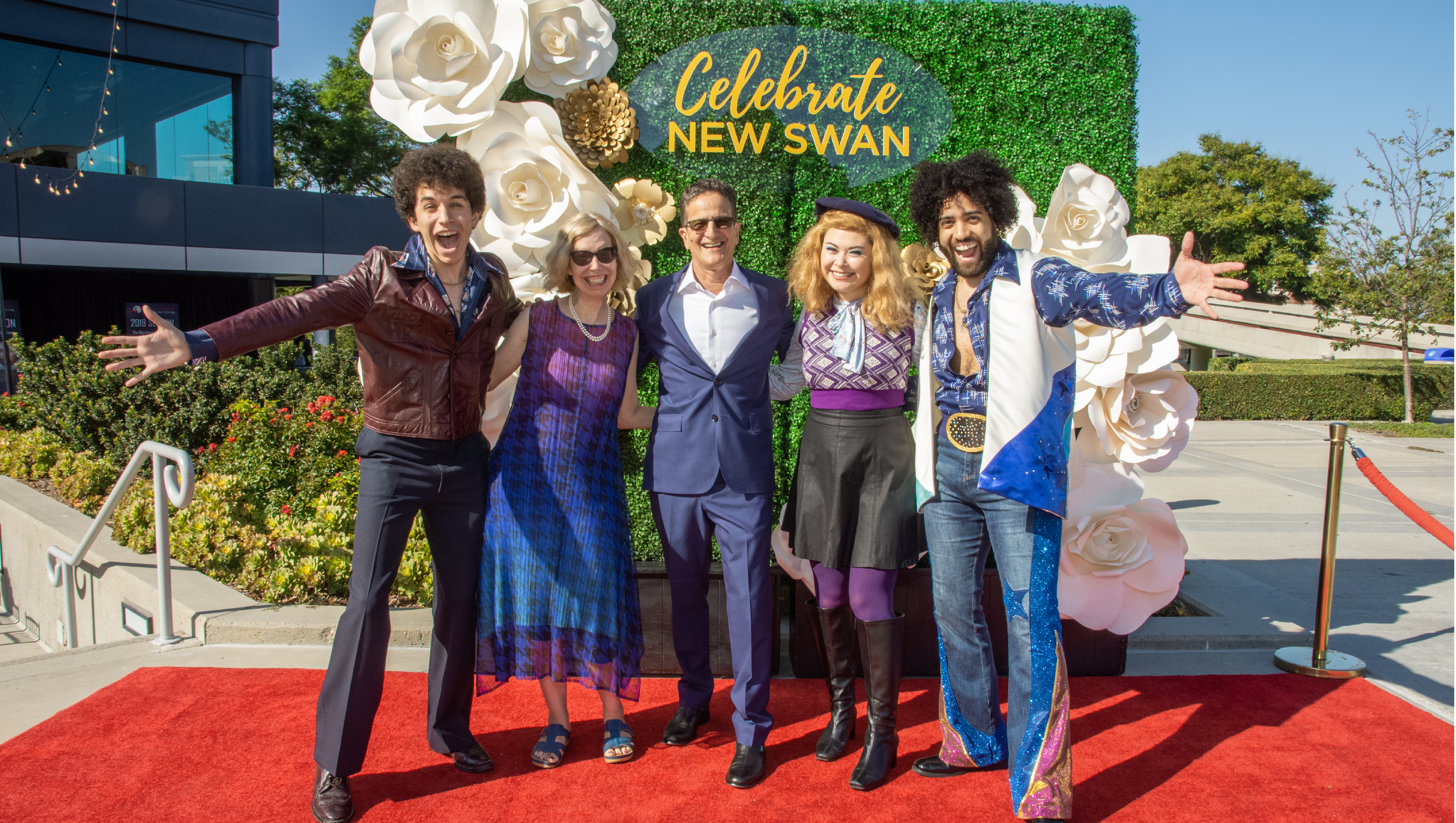
By Nikki Babri
Four centuries after his death, William Shakespeare’s works continue to offer insights into our most urgent contemporary challenges. At the forefront of making these connections is Julia Reinhard Lupton, Distinguished Professor of English at UC Irvine and co-director of the New Swan Shakespeare Center.
Shakespeare’s enduring relevance
For Lupton, one of the nation’s leading Shakespeare scholars who has taught students at UCI for over 35 years, Shakespeare’s lasting relevance stems from what she calls his “infinite variety” – a phrase borrowed from Antony and Cleopatra that aptly describes both the playwright and Lupton’s approach to his works.
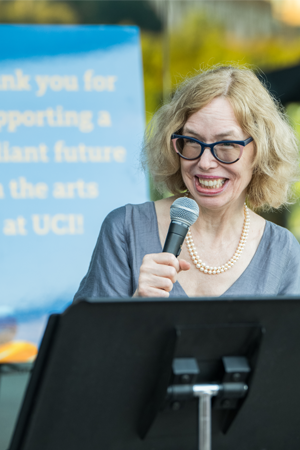
When asked why today’s students should care about a playwright from the 16th century, Lupton offers compelling reasons. For one, he invented the rom-com. “If you like rom-coms, read Shakespeare’s romantic comedies and discover all the archetypes, all the characters, all the situations that make us laugh and cry today,” she says. From mistaken identities and love triangles to witty banter and happily-ever-afters, Shakespeare established the romantic comedy formula that still dominates our screens 400 years later.
Beyond entertainment, Shakespeare provides a lens for understanding contemporary politics and power dynamics. “Shakespeare wrote about love, ambition and betrayal,” Lupton explains, noting how his plays depict powerful, larger-than-life figures with outsized egos “working the room” and “working their images” in ways that mirror today’s media-amplified personalities. His exploration of political calculation, misplaced trust and deception offers insights not just into national politics but also into institutional dynamics and personal, day-to-day relationships – revealing just how little human nature has changed despite centuries of technological and social evolution.
Creating the New Swan Shakespeare Center
In 2012, Lupton helped establish the New Swan Shakespeare Center as a partnership between the School of Humanities and the Claire Trevor School of the Arts. The center’s programming complements the New Swan Shakespeare Festival, which performs two plays in rotating repertory each summer in an intimate outdoor theater modeled on an Elizabethan stage.
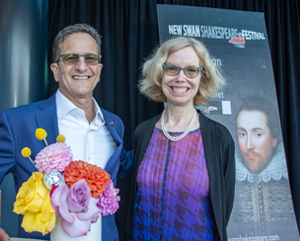
Lupton, who directs the educational and academic programs for the center, offers year-round academic and public programming that has established UCI as the UC system’s premier campus for the production, study and enjoyment of Shakespeare.
The partnership’s success stems from the rare collaborative spirit between Lupton and Eli Simon, Chancellor’s Professor of acting and the festival’s artistic director. “Julia is the beating heart of the New Swan Shakespeare Center. She cares deeply about community engagement and puts this into practice with every seminar, reading group and special Bard event she hosts,” says Simon. “I’m constantly amazed at the ways she combines deep Shakespearean analysis and textual insightfulness with an enduring commitment to serving her students and our ever-expanding New Swan community.”
Making Shakespeare accessible
Under Lupton’s guidance, the center has developed innovative programming that makes Shakespeare accessible to diverse audiences. The annual Shakespeare Trial, which puts a character on trial with real lawyers arguing the case, has become one of their most popular events, regularly drawing 400 in-person attendees with additional online participants.
“People come to the trial who don’t want to go to a play, but they’re interested in seeing a character put on trial for a crime and then voting whether the character is innocent or guilty,” Lupton explains. “We’re looking for experiences that open up the scholarship. It’s very much a blending of law, literature and performance.”
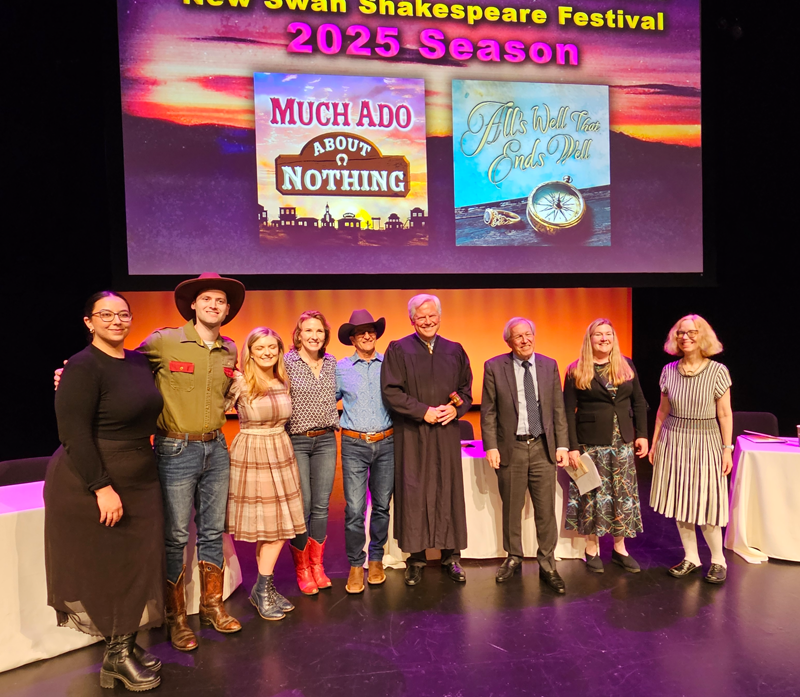
This emphasis on accessible entry points extends to the center’s educational outreach. One of New Swan’s signature programs, Educators Day, brings language arts teachers to campus for immersive learning experiences that help them incorporate Shakespeare in their classrooms – an initiative particularly meaningful to Lupton, who was first introduced to Shakespeare when she took an elective on his history plays in high school. Additional community-focused initiatives include First Folio Fridays that provide access to special collections, reading groups where participants read plays aloud and the Summer of Scholarship lecture series that showcases graduate student research in a public-facing format.
The impact of these programs extends far beyond campus. Approximately 5,000 patrons across Orange County attend the summer festival – at least half of whom are not affiliated with UCI. “We see ourselves as a kind of gateway to the community,” shares Lupton.
This philosophy of accessibility has led the center to explore thematic approaches connecting Shakespeare to contemporary issues. In keeping with Shakespeare’s relevance to modern concerns, scholars have increasingly focused on environmental themes in his works. The center’s 2026 annual Kirk Davis Jr. Public Shakespeare Lecture, entitled “BIOphilia” (a play on “biology” and “Ophelia”) and directed by Theo Black from Cornell University, will explore ecological elements in Hamlet.
“Shakespeare’s plays often take place in a ‘green world’ – a forest, island or garden where characters try on new roles and stretch social norms,” Lupton explains. “Sometimes, the green world is under threat: tempests on the heath, drought in the fields, erosion on the coast or forests on the move. These vibrant, vulnerable landscapes give climate-minded scholars and theater makers a lot to work with.”
Teaching the next generation
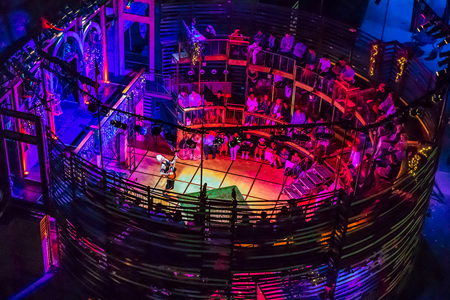
Equally central to Lupton’s vision is mentoring emerging scholars. Through the New Swan Shakespeare Fellows program, graduate students gain hands-on experience leading events, attending plays and writing for public audiences – what Lupton likens to a “teaching laboratory.”
Recently, the center launched “Classics Reimagined,” its first formal partnership with UCI undergraduates, where English and drama majors explore old texts through contemporary lenses of diversity and LGBTQ+ issues.
Outside the New Swan Shakespeare Center, Lupton’s influence can be felt across and beyond UCI. In 2019, she developed the first online Shakespeare course in the UC system, which is taught twice a year and has been taken by hundreds of UC students.
In 2023, she received the prestigious Daniel G. Aldrich, Jr. Distinguished University Service Award for her extraordinary contributions to UCI. From founding Humanities Out There (H.O.T.) in 1997 to serving as the School of Humanities’ first Associate Dean for Research and as Interim Director of the UC Humanities Research Institute, her leadership has shaped countless programs on campus. Furthermore, as the inaugural director of Illuminations: The Chancellor’s Arts and Culture Initiative, Lupton provided opportunities for the entire UCI community, regardless of one’s major, to engage with arts and humanities through diverse programming.
Lupton’s current research examines Shakespeare through the lens of virtue ethics, exploring how his plays illuminate human capacities for both destruction and renewal. “What is the good life? Why is it so easy to destroy the things that matter most to us? How can virtues help us repair what we’ve broken?” she asks. This scholarly focus connects to her contributions to UCI’s Anteater Virtues Project, where she created videos demonstrating how Shakespeare’s characters model various intellectual virtues – work she plans to expand into a book.
A continuing legacy
Although retiring from teaching in June, Lupton plans to dedicate more time to the New Swan Shakespeare Center, expanding its work with teachers and undergraduates while building international partnerships. Her vision includes continuing collaborations with Cambridge University’s Von Hügel Institute and the Flying University for Ukrainian Students (FUUS), where she teaches Shakespeare to students in a war zone. “Shakespeare is constantly being renewed by artists, audiences and scholars,” Lupton explains. “The infinite variety of Shakespeare never ceases to astound me.”
Interested in reading more from the School of Humanities? Sign up for our monthly newsletter.
